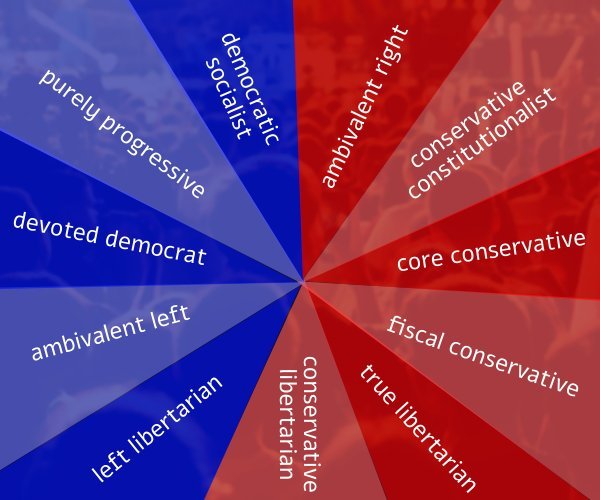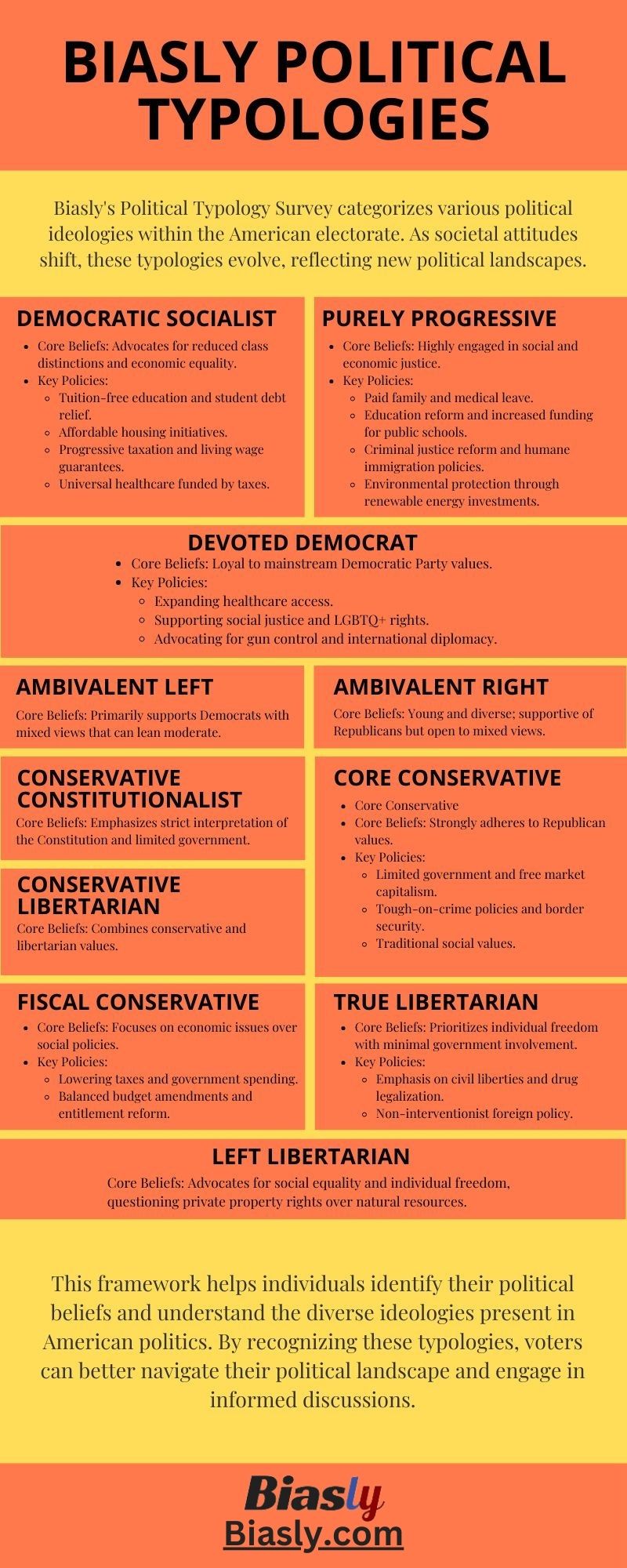
A political typology is a system used for categorizing different political ideologies and characteristics based on their similarities. Biasly identifies and defines a series of voter profiles that represent specific segments of the American electorate. As the electorate changes, so do the typologies. Certain typologies exit the electorate and others rebrand themselves or enter the spectrum.
Through our Biasly Political Typology Survey, we provide questions about leanings and bias positioning to help people assess their personal political typology and leaning. The survey provides a finalized typology score that people identify with. Note this score can change as attitudes adjust. Below is a list of these typologies we use in our survey.
Political Typologies Used by Biasly
Below is a list of political typologies used by Biasly in its Political Typology Survey.
Democratic Socialist
Views tend to favor the left-leaning political philosophy. This group’s views argue that the current capitalist ideals contradict values such as citizen benefits and economic privilege. This group seeks to reduce class distinctions and focuses on advocating equality for everyone in these ways:
Social:
- Free or Affordable Education tuition-free college and student debt relief
- Affordable Housing: government-funded housing programs, rent control measures, and subsidies for low-income families..
Inequality:
- Progressive Taxation: wealthy pay a higher percentage of their income compared to lower classes.
- Living Wage: guaranteeing that workers’ make livable wage off one job, usually at least $15 an hour.
- Workers’ Rights: strengthen labor unions, protect workers from exploitation, and ensure safe working conditions
Healthcare:
- Universal Healthcare: the government funds healthcare coverage for all citizens via taxes.
Purely Progressive
Views are typically highly liberal compared to other Democratic parties and tend to be the most politically engaged. This group seeks to improve living conditions for citizens such as fighting for equality and accepting a more open immigration policy.
Equity:
- Paid Family and Medical Leave: allowing workers to take care of themselves and families without losing income.
- Education Reform: increased funding for public schools, universal pre-kindergarten programs, and college affordability initiatives.
Justice:
- Immigration: Providing a pathway to citizenship for undocumented immigrants, humane treatment for refugees and asylum seekers, and ending immigration enforcement measures like family separation, raids in immigrant communities, and mass deportations.
- Criminal Justice Reform: ending mass incarceration and racial disparities in the criminal justice system through ending cash bail, implementing police accountability measures, and investing in alternatives to incarceration.
- LGQBT+ Rights and Equality: anti-discrimination laws, marriage equality, and transgender rights and healthcare.
- Voting Rights: automatic voter registration, early voting options, mail-in voting, and restoring voting rights to formerly incarcerated individuals.
Sustainability:
- Environmental Protection: investing in renewable energy sources, regulating carbon emissions, and protecting natural resources.
Devoted Democrat
Views strongly hold true to mainstream views of the Democratic party. This group is the most loyal to the party and its liberal ideologies.
Fiscal:
- Healthcare Reform: expanding access to healthcare and improving upon policies like the Affordable Care Act. Ensuring affordable healthcare coverage for all citizens and supporting measures to regulate prescription drug prices.
- Education: investing in public education, increasing access to higher education, and reducing student loan debt. This includes policies such as universal pre-kindergarten, increased funding for schools in low-income areas, and tuition-free community college.
- Trade: supporting free and fair trade agreements.
Social:
- Social Justice: advocating for policies to promote social justice and equality, including efforts to address systemic racism, discrimination, and inequality. Supporting criminal justice reform, voting rights protections, and initiatives to promote diversity and inclusion.
- LGBTQ+ Rights: supporting LGBTQ+ rights and policies to protect against discrimination based on sexual orientation and gender identity.
- Reproductive Rights: supporting safe and legal abortion in most or all instances. Abortion is a deeply personal issue that is best left to a woman and her doctor.
Legal:
- Gun Control: strengthening gun control laws, such as universal background checks, bans on assault weapons and high-capacity magazines, and closing loopholes in existing gun laws. Goal is to reduce gun violence and promote public safety while respecting Second Amendment rights.
- Death Penalty: believes the death penalty does not deter crime and is a cruel and unusual punishment.
International Issues:
- Foreign Policy: prioritizing diplomacy and multilateralism, favoring international cooperation and alliances. It also includes efforts to promote human rights, democracy, and peacekeeping initiatives while also advocating for a responsible and strategic approach to military intervention.
Ambivalent Left
This group primarily supports the Democratic party and liberal policies but can also have mixed views with some moderate and even conservative leanings. For example, this group may support strict immigration policies, harsh crime policies, and school vouchers.
Ambivalent Right
The majority in this group claim to support the Republican party but can also have mixed views. Most in this group tend to be younger and more diverse compared to other right-leaning categories. For example, they may support same-sex marriage and environmental regulations.
Conservative Constitutionalist
People within this category hold a strict interpretation of the U.S. constitution expressed by the founding fathers of the United States including a smaller government and limited powers of the federal government. Constitutional conservatives prioritize defending liberty over anything else.
Core Conservative
Views strongly hold true to mainstream views of the Republican party. This group is the most loyal to the party and its conservative ideologies.
Fiscal Conservatism:
- Limited Government: a smaller government that serves a few basic functions such as protecting individual rights and national security. Reducing government regulations and bureaucracy.
- Free Market Capitalism: a Laissez-faire approach with minimal to zero government intervention best promotes economic prosperity and innovation.
War Hawks/Tough-On-Crime:
- National Security: a robust military, assertive foreign policy, and measures to combat terrorism are necessary to protect national sovereignty.
- Law and Order: support tough-on-crime policies and law enforcement agencies, such as the police and Border Patrol.
- Border Security: building a border wall, enhancing border patrol resources, and implementing stricter immigration controls. Strict immigration policies that make it difficult for the undocumented to become citizens.
Social Conservatism:
- Pro-Life: opposed to abortion and favor policies that restrict or regulate access to abortion services. This includes bans in the first and second trimesters, defunding Planned Parenthood, and promoting adoption alternatives.
- Traditional Values: emphasize the importance of traditional values and institutions such as the family, marriage, and religion. Opposed to the expansion of LBGTQ+ rights and their acceptance into society and advocate for school vouchers.
Fiscal Conservative
Individuals in this group are typically focused on economic factors such as reducing government spending and lowering the national debt. Unlike other conservatives, this group seeks to lower taxes, and the national debt and does not focus on social policies that compete with such fiscal conservatism.
- Tax Cuts: lower tax rates, especially for individuals and businesses.
- Reducing Government Spending: cutting spending in areas deemed non-essential for the federal government and best left to the private sector.
- Balanced Budget Amendment: ensuring that the federal government remains within its budget to reduce the national debt.
- Entitlement Reform: reforming Social Security, Medicare, and Medicaid to reduce their long-term costs and make them sustainable for generations. Typically involves adjusting eligibility criteria, raising the retirement age, or introducing means-testing.
- Free Trade: free trade agreements and reducing tariffs and trade barriers.
- Savings and Investment Initiatives: tax-advantaged retirement accounts or capital gains tax cuts.
True Libertarian
This group tends to emphasize maximizing individual freedom and is skeptical of a large government. Political views are focused on minimal regulation, small government, and low government involvement.
- Individual Freedom: emphasis on policies that protect individual rights, including freedom of speech, freedom of association, and the right to privacy.
Fiscal:
- Free Market Economy: economic matters are left to the private sector, where individuals and businesses can exchange goods and services without government intervention.
- Decentralization: decisions should be left to the lowest level of government possible, typically state or local government.
- Privatization: private enterprise is better suited to handle traditionally public matters such as education, healthcare, and infrastructure.
Social:
- Civil Liberties: the right to self-defense, religious freedom, and freedom from unwarranted government surveillance.
- Legalization of Drugs: individuals should have complete autonomy over their bodies.
- Criminal Justice Reform: reducing or eliminating mandatory minimum sentences, ending the war on drugs, and addressing issues such as police brutality and civil asset forfeiture
Foreign Policy:
- Non-Interventionist: opposing military intervention and foreign entanglements unless directly necessary for national defense.
Conservative Libertarian
The philosophy of this political group combines conservatism and libertarianism. Members of this group may advocate for anti-abortion policies, economic liberty, and less government regulation.
Left Libertarian
This group is a branch of libertarianism that is a left-leaning form of libertarianism. Members of this group agree with most libertarian ideologies except the right to private property of natural resources. They believe we have equal rights over nature. These ideologies stress social equality and individual freedom.





























